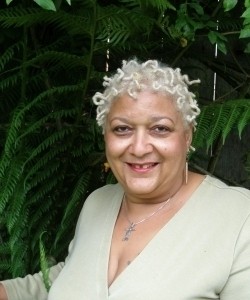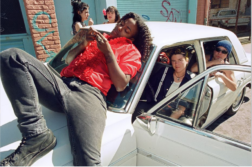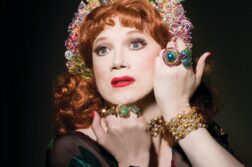ON A COLD and drizzly day in San Francisco, Jewelle Gomez, recipient of a Lambda Award and fellowships from the National Endowment for the Arts, the California Arts Council, and the San Francisco Arts Commission, bubbles with lightness and luminescence. The same compassion that drives her work infuses her interactions: she’s concerned about a baby being protected from the rain; she worries about a young girl who has wandered away from her mother; she notices that a woman drinking her coffee will sit on a bench that’s missing a seat cushion—and so she offers her one.
 Gomez is the author of the award-winning novel Gilda (Firebrand Books, 1991) and the short fiction collection Don’t Explain (Firebrand Books, 1998); the essay collection 43 Septembers; the poetry collections The Lipstick Papers (self-published, 1980), Flamingos and Bears (self-published, 1987), and Oral Tradition: Selected Poems Old and New, (Firebrand Books, 1995); the plays Bone and Ash, a theatrical adaptation of Gilda, and Waiting for Giovanni, about James Baldwin’s process of creating Giovanni’s Room; and numerous reviews and essays. As an activist, Gomez was a founding member of GLAAD (the Gay & Lesbian Alliance Against Discrimination).
Gomez is the author of the award-winning novel Gilda (Firebrand Books, 1991) and the short fiction collection Don’t Explain (Firebrand Books, 1998); the essay collection 43 Septembers; the poetry collections The Lipstick Papers (self-published, 1980), Flamingos and Bears (self-published, 1987), and Oral Tradition: Selected Poems Old and New, (Firebrand Books, 1995); the plays Bone and Ash, a theatrical adaptation of Gilda, and Waiting for Giovanni, about James Baldwin’s process of creating Giovanni’s Room; and numerous reviews and essays. As an activist, Gomez was a founding member of GLAAD (the Gay & Lesbian Alliance Against Discrimination).
Gomez’ fiction has won her the admiration of the Indigenous Futurism movement, which focuses on the speculative fiction of Native peoples, and she is revered as a leader in the black science fiction movement known as Afrofuturism. In 1997, Gomez participated in one of the first conferences on black speculative fiction, “The African-American Fantastic Imagination: Explorations in Science Fiction, Fantasy and Horror.” She co-edited, with Eric Garber, a gay and lesbian science fiction/fantasy anthology titled Swords of the Rainbow (2000).
As we celebrate the 25th anniversary of Gilda with an expanded anniversary edition from City Lights Publishers, Gomez continues to create new work, including the forthcoming Televised, a novel about black activists from the 1960s, and a new Gilda novel.
This interview was conducted in person at Destination Bakery in San Francisco.
Rochelle Spencer: With the 25th anniversary of Gilda, where do you situate your fictional work? Is it Afrofuturism? Some critics and readers think of you as one of the foremothers of this genre.
Jewelle Gomez: When I started doing the Gilda stories, African-Americans were skeptical of my doing anything that was speculative fiction. African-American friends and writers said “black people have too many horrible things to deal with in the present. Why would you go off speculating when we have so many things to worry about?” That was weird to me because I felt that speculative fiction had so much to show us about possibilities for social change and equality. I started writing during the Women’s Movement, when speculative fiction was huge. Joanna Russ [speculative fiction writer and critic]and The Women of Wonder [a classic sci-fi anthology of women’s writing]used speculative fiction to talk about social change and to imagine a better world.
I guess I am a foremother of Afrofuturism. When I first read Octavia Butler, I went crazy with joy. There just weren’t many African-Americans writing sci-fi. Her work told me that, yes, I could write this kind of fiction—speculative fiction.
RS: The Black Arts Movement [BAM] has been lauded for pointing out the politics embedded in art—its social justice aspect, its defiance of mainstream aesthetics—but it has also been described as sexist, homophobic, and essentialist in its view of black culture. What’s your take on this controversy?
JG: I don’t get invited to read at black bookstores, and when Gilda first came out, the black community was very suspicious of the vampires—and the lesbianism. I think the Afrofuturism movement is more open. But there’s also a kind of slightly libertarian moment where they don’t always appear to be looking at what was missing from the Black Arts Movement and how to attract diverse voices to it. Still, I was invited to Bates College in Maine and was there for four days discussing Afrofuturism and the roles of vampires in the future. Also, horror writer Tananarive Due invited me to Spelman College for a conference on black speculative fiction.
I was part of the first conference on black speculative fiction along with Octavia Butler, Samuel Delany, Tananarive Due, and Steven Barnes at Clark Atlanta University. These writers were supportive of each other. I had previously met Octavia Butler at one of the black women writers’ conferences in the mid 1980s, and she told me to send her a story. There was this coterie of writers, both writers of color and women, who were blossoming at least fifteen years ago. And Nalo Hopkinson’s Brown Girl in the Ring (1998) was confirmation that the next generation would embrace this work. At the CAU conference, it felt like all of us black science fiction writers were together in one room, but I couldn’t name all of the African-American writers creating speculative fiction now—there are just so many people writing.
RS: Gilda is scattered with allusions to LGBT writers, from Harlem Renaissance poet Alice Dunbar Nelson to speculative fiction writer Joanna Russ to the acclaimed novelist James Baldwin. What’s the thinking behind these references to earlier writers?
JG: Part of it is laying down our history and remembering those who went before. I was raised by my great-grandmother, of Ioway Indian heritage, and by my grandmother, who was very articulate about her history. I gained a lot from knowing about their lives and history, and they weren’t famous. My grandmother made a living as a chorus girl and tap dancer. Their lives and choices told me about the world of possibility.
RS: Do you have plans to write a memoir?
JG: I haven’t thought about writing a memoir. But one of the reasons I try to bring in influences is so we don’t forget them—and how our lives have been shaped by them. I write historical fiction—speculative historical fiction—and my plays are historical. I love to explore these lives to see how amazing our foremothers and forefathers were.
RS: Your play about James Baldwin explores the history behind his writing of Giovanni’s Room. Can you talk about this work?
JG: I had so much fun writing that play. My friend Harry [co-collaborator on the script] asked me to write something about Baldwin, and I thought he meant a monologue, not an entire play. So I started rereading all of Baldwin’s work and all of the essays about him. I had his voice in my head, I read him so much. Personally, I felt like his emotional life was overshadowed by the movement, by being a spokesperson for African-American activists. Perhaps he grew tired of explaining black people to white people. It felt like a pivotal moment for him to decide to write Giovanni’s Room, because the book’s subject matter was “gay” and not “black.” What does Baldwin do when everyone in his head, all the voices from his past—including Richard Wright, his intellectual father—are telling him not to write this book? It becomes an internal battle, and he’s afraid the black community will reject him. His lover is white and French and trying to convince him to write it, but in the play, you see Baldwin’s struggle. Giovanni’s Room also tells a story about racism, even though the characters are white. It’s also about class and colonialism—all the things that Baldwin tended to write about.
RS: Many people don’t realize that you’ve had an extensive career in film and television. With the popularity of Buffy the Vampire Slayer, I wonder whether we’ll some day see Gilda on television or on film.
JG: When I was young, I watched a lot of TV science fiction—Star Trek, The Twilight Zone—and I knew these stories were dealing with the issues of the day, only through a different genre. I’m a big fan of the broadcast media. I’ve had several interviews with people interested in Gilda, but I would hate for anyone to mess her up. Maybe some independent person or company could develop Gilda for film, but I can’t see it as a series. It’s a delicate balance—a balance of feminism, lesbianism, and African-American culture—and I don’t know many people in television who would be interested in those things.
RS: And yet, things do appear to be changing, and more people seem to be interested in hearing the stories of LGBT characters and people of color.
JG: Things are changing. Vampire fans are true fanatics. They’re just like vampires! They don’t care if Gilda is a lesbian, black, or whatever; they’re just into vampires. I went to thirteen cities, and vampire fans showed up everywhere. The world has opened up. It’s interesting how times have changed. I received a holiday card from a woman in New Jersey who had named her cat after Gilda. The woman was a young white librarian, and she’s emblematic of what I like to do with my fiction, which is cross all boundaries so that people will embrace the stories. A lot of young women, and women of color, didn’t have the opportunity to read about heroic figures. They didn’t have the opportunity to read about women of color who stood out as powerful and kind and yet were still growing up and finding their way. I get to see Gilda grow up for 200 years, and I had those young women of color in my mind as I was writing.
One of the other things I wanted to do was to show how women of color and lesbians of color showed up throughout history. We didn’t just show up at Stonewall or in the Civil Rights Movement. We were there from the beginning. Vampires made it possible to tell those stories. What could our role have been post-slavery? What might we have been during World War II or the Great Migration? Gilda is living through these times, and her work is through ordinary people and showing how they learn to be heroic. I think a good story is about political situations and the interior lives of the characters and how those two things interact. These ideas are timeless, whether it’s 1890 or 1990. I can read Henry James and think, “This is really deep—this class stuff, and the emotions are really intense.” Someone can read Gilda and feel the same way.
RS: Some black women writers say they are aware of the negative portrayals of black men in novels and television, so they’re particularly sensitive to this topic in their writing.
JG: I definitely have been—I try to pay attention. I had an interesting experience during a college talk, after I’d read a couple of sections from Gilda, and a male student remarked that “Gilda only takes blood from men.” But when you think about it, women were rarely on the street alone, so it would be harder for that to happen. When I write, I try to think, “Who are the bad guys?” I don’t want the bad guys to be all white or all male. I never wanted to give the impression that I thought all black men were violent and horrible. In Bones and Ash [the theatrical production of Gilda], I took one of the characters and gave him a bigger part to try and avoid this conflict. I really didn’t want people to come away from the play thinking, “She really has it in for black men.” Being political doesn’t mean putting limitations on my work; I’m challenging myself to write in accordance with my political beliefs.
RS: You’ve written poems, plays, novels, short stories; what kind of writing do you enjoy the most?
JG: Gilda is my favorite writing. She pops out of nowhere, and she has a story to tell. I didn’t have any transgender people in Gilda, but in the sequel I want to think about how transgender people fit into the narrative. As someone who feels politically responsible, it’s important for me to think about this.
RS: Any other thoughts about the future of Afrofuturism?
JG: I was teaching a class to writers over fifty at a lifelong learning center in Berkeley. It’s interesting to ask someone who is sixty or seventy to imagine the future, which can be particularly upsetting, because they won’t be here. I asked students to write about losing one ability and perhaps gaining another. One man wrote a story about a person who goes blind but gains a kind of touch perception that allows for a deeper understanding of the world. That’s what futurist writing can do—imagine how things can change for the better.
People are finally catching up with the idea that we have so many possibilities, even though a lot of people have lost hope. Young people commit themselves to capitalism, thinking that capitalism will save them, but capitalism is failing. The Black Power Movement was about changing that, until people realized, “I can be as bad as the white man can be.” Afrofuturism is a response to that intensely negative sensibility. I see Afrofuturism as a sign of hope, as a sign of hope returning.
Rochelle Spencer, author of the novel Ella Jones and Her Magical Vagina, has contributed short fiction to a number of publications.






